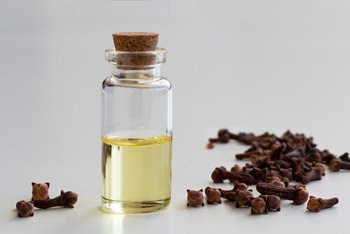Toothaches are uniquely irritating. They’re painful, and getting to a dentist for immediate attention may be inconvenient. You can use over-the-counter pain medications, but natural treatments are also available to treat the pain.
One of these preferred remedies is cloves. For centuries, cloves have been used as a pain relief technique. Historically, treatments called for inserting a clove into an infected tooth or cavity. They contain an active ingredient that numbs the skin they touch, which may provide temporary relief from the toothache.
Today, instead of grinding cloves, we use clove oil. Clove oil is the concentrated product extracted from the plant. Read on for instructions on using clove oil.

A few things you’ll need (pain relievers) for dental pain:
If you’re going to try using clove oil as a pain reliever for dental pain, you’ll need a few things, including:
- A bottle of clove oil or powder
- A cotton swab or cotton ball
- A carrier oil (such as coconut oil, almond oil, or olive oil)
- A small dish
You can also use clove powder meant for baking, but clove oil is more effective.
### What are the steps for using clove oil?
1. Collect the supplies and ingredients you need.
2. Squeeze a few drops of clove oil with 1 teaspoon of olive oil into your dish.
3. Soak your swab or cotton ball with the clove oil.
4. Gently swipe the swab or cotton ball around the area that is bothering you, or place the cotton ball over the area.
5. Allow the oil to sit for 5 to 10 minutes to start working.
6. Reapply every 2 to 3 hours for relief.

### Other ways to use clove oil
Other methods for using clove oil to help relieve dental pain include:
- Oil pulling: To perform oil pulling, swirl clove oil mixed with coconut oil in your mouth. Focus on swishing the oil in the affected area to avoid numbing your whole mouth.
- Clove paste: You can also make a paste or gel by grinding fresh whole cloves and mixing them with oil. This is less effective than using concentrated oil.
### Where can you find clove oil?
Look for clove oil in the medicinal section of your supermarket or the home remedies section of your pharmacy. Always dilute essential oils with a carrier oil. Carrier oils are neutral oils, such as vegetable or nut oils, that help dilute stronger essential oils to make them easier to use and more palatable. Stop use if the clove oil is too strong, upsets your stomach, or causes a burning sensation.

### What does the research say about clove oil?
Clove oil contains the active ingredient eugenol, a natural anesthetic. Eugenol helps numb and reduce pain to ease a toothache. It also has natural anti-inflammatory properties, which may reduce swelling and irritation in the affected area. Dry Socket Paste, an over-the-counter (OTC) treatment dentists recommend for tooth extraction pain, contains eugenol.
A French clinical trial in an emergency dental unit found that eugenol was more effective than articaine at reducing pain following treatment for irreversible pulpitis, an extremely painful dental condition. However, both treatment options were effective at reducing pain.
A 2020 review of the literature related to clove oil notes that research suggests it is an effective analgesic for tooth and joint pain and has other potential health benefits.
### What are the risks of using clove oil on your teeth?
Clove oil is naturally unpleasant to taste. Avoid swallowing any of it. Ingesting clove oil can lead to several side effects, including:
- Breathing difficulties
- Burning in your nose and throat
- Upset stomach
- Diarrhea
While clove oil is widely seen as an acceptable alternative treatment for toothaches, mainstream medical doctors do not widely support it. Talk with your dentist if you have any questions about using clove oil for toothache relief.
Infants and children: Never give clove oil to a child to eat or drink. Clove oil is meant to be daubed on an area, not swallowed.
Keep clove oil and other essential oils out of reach of children. If a child swallows clove oil by mistake, it can make them very ill.
Consult with your pediatrician or healthcare professional before using clove oil to treat your child.
Be sure to mix the clove oil with a natural carrier oil if you want to use this treatment topically for your child or infant. These oils dilute the strength of the oil. Never use full-strength clove oil on the skin.
